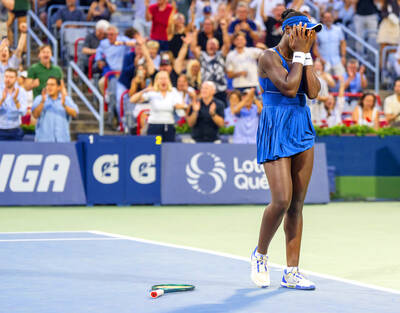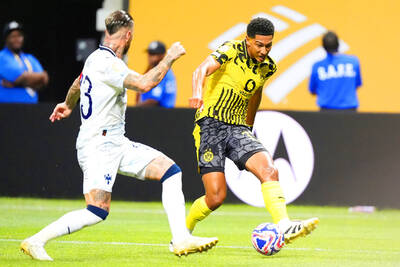China might bar live television broadcasts from Tiananmen Square during the Beijing Olympics, apparently unnerved by the recent outburst of unrest among Tibetans and fearful of protests in the heart of the Chinese capital.
A ban on live broadcasts would disrupt the plans of NBC and other major international networks, who have paid hundreds of millions of dollars to broadcast the Aug. 8 to Aug. 24 Games and are counting on eye-pleasing live shots from the iconic square.
The rethinking of Beijing's earlier promise to broadcasters comes as the government pours troops into Tibetan areas wracked by anti-government protests this month and stepped up security in cities, airports and entertainment venues far from the unrest.
In another sign of the government's unease, 400 American Boy Scouts who had been promised they could go onto the field following a March 15 exhibition game between the Los Angeles Dodgers and San Diego Padres were prevented from doing so by police.
"It was never specifically mentioned to me it was because of Tibet that there were extra controls, but there were all these changes at the last minute," said a person involved in the Major League Baseball event who asked for anonymity.
The government's resorting to heavy-handed measures runs the risk of undermining Beijing's pledge to the International Olympic Committee (IOC) that the Games would promote greater openness in what a generation ago was still an isolated China. If still in place by the Games, the security measures could alienate the half-million foreigners expected at the games.
Like the Olympics, live broadcasts from Tiananmen Square were meant to showcase a friendly, confident China -- one that had put behind it the deadly 1989 military assault on democracy demonstrators in the vast plaza that remains a defining image for many foreigners.
"Tiananmen is the face of China, the face of Beijing, so many broadcasters would like to do live or recorded coverage of the square," said Yosuke Fujiwara, the head of broadcast relations for the Beijing Olympic Broadcasting Co (BOB), a joint venture between Beijing Olympics organizers and an IOC subsidiary.
The BOB coordinates and provides technical services for the television networks with rights to broadcast the Olympics, such as NBC.
Earlier this week, however, officials with the Beijing Olympics Organizing Committee (BOCOG) told executives at the BOB that the live shots were canceled, according to three people familiar with the matter who requested anonymity.
Sun Weijia (孫維佳), the BOCOG official in charge of dealing with the BOB, declined comment, referring the matter to press officers, three of whom also declined to comment.
The decision by BOCOG may not be final. The change was relayed verbally, one person said. All three hoped that IOC president Jacques Rogge and other leading Olympic committee officials, expected in Beijing next month for regularly scheduled meetings, may be able to prevail on the Beijing committee to change its mind.
It's unclear whether the ban would apply to coverage of the Olympic marathon, which starts in Tiananmen. An early indicator will be a marathon test event scheduled for next month.
If the decision stands, it would be a blow to the TV networks whose money to buy the right to broadcast the Games accounts for more than half the IOC's revenues.
The Tibet unrest and the government's harsh response underscores the communist leaders' unease as the Olympics approach.
With paramilitary police patrolling Beijing at night and journalists being expelled from Tibetan areas, security measures are on par with those not seen since the government mobilized police to crush the Falun Gong spiritual movement in 1999 and 2000.
Activists have said for months that they planned to use the Olympics to promote their causes. The challenge faced by China's leadership seems to grow more imminent.

Taiwan’s top women’s badminton doubles duo, Hsieh Pei-shan (謝沛珊) and Hung En-tzu (洪恩慈), achieved a straight-sets victory over Japan’s Kaho Osawa and Mayui Tanabe at the Badminton World Federation (BWF) Super 300 Macau Open on Sunday. The Taiwanese pair won the final 21-18, 21-12, marking the duo’s second title this year after their win at the BWF Super 300 Taipei Open in May. The match on Sunday was their first encounter with the Japanese duo, ranked No. 63 in the world. Hsieh and Hung, ranked No. 12, began the opening game well. Hung, who plays left-handed, performed strongly at both the net and the

Canadian teenager Victoria Mboko upset top-seeded Coco Gauff 6-1, 6-4 on Saturday night to reach the National Bank Open quarter-finals. “Your support was incredible,” Mboko told the crowd in French after a chorus of “Ole, Ole, Ole” chants echoed around the venue. “I’m really happy to win today ... It’s incredible. I’m so happy to beat such a great champion.” Gauff dropped to 2-3 since winning the French Open. She followed the major victory with opening losses in Berlin and Wimbledon, then overcame double-fault problems to win two three-set matches in Montreal. Gauff had five double-faults on Saturday after having 23 in

Formula 1 champion Max Verstappen on Thursday said that he is staying with the Red Bull team next year, ending months of speculation over his future. “Some people just like to stir the pot, some people just like to create drama, but, for me, it’s always been quite clear, and also for next year,” the four-time champion said ahead of the Hungarian Grand Prix. “I’m discussing with the team already the plans — the things that we want to change for next year, so that means that I’m also staying with the team for next year,” he said. Verstappen has a contract with

Jobe Bellingham on Tuesday admitted to having “anxieties” on following in brother Jude’s footsteps after joining Borussia Dortmund in the summer. Jobe Bellingham, 19, is two years younger than Jude Bellingham, who joined Real Madrid in 2023 after three years at Dortmund. A centerpiece of the England national team, Jude Bellingham has emerged as one of the best players in the world in recent seasons. The younger Jobe Bellingham joined Dortmund in June from Sunderland after their promotion to the English Premier League. He admitted he understood what the perception would be ahead of the move to Germany. “It’s something you do think about.